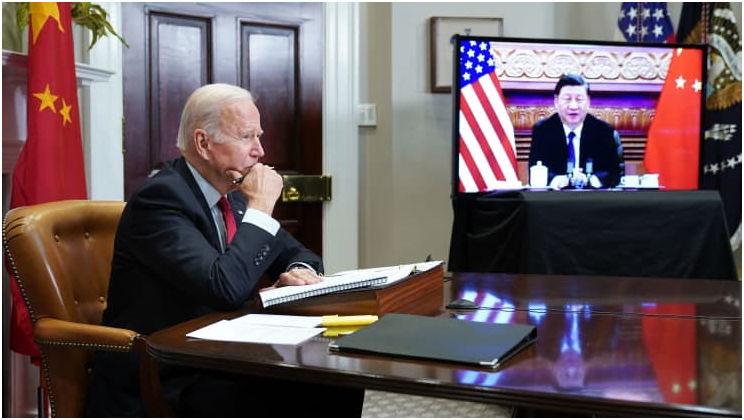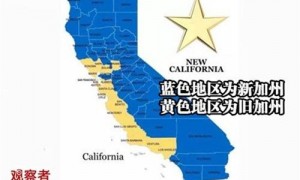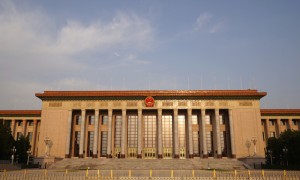BEIJING — U.S. President Joe Biden and Chinese President Xi Jinping ended a call Thursday with plans to arrange a face-to-face meeting for the first time since Biden took office, a senior U.S. official said during a briefing.
However, Xi stuck to strong words on the Taiwan issue, while Biden said the U.S. position has not changed, according to official readouts from the U.S. and Chinese governments.
The readouts did not mention plans for an in-person meeting, but noted both sides plan to maintain communication. The U.S. official was briefing reporters after the call.

"There was an exchange at the end about ... a conversation about a face-to-face meeting being worked out between the teams," the official said, according to a White House transcript. "From my perspective, there was very much a clear, affirmative agenda that was put forward and agreed to."
China's Ministry of Foreign Affairs did not immediately respond to a request for comment.
The two leaders' latest conversation came during a tense period between their countries, particularly over recent rhetoric around Taiwan. Beijing considers the democratically self-ruled island as part of its territory.
"That the call happened is a mild positive and shows both leaders want to maintain a floor under deteriorating bilateral ties," Eurasia Group analysts said in a note. "Any future cessation of top-level US-China dialogue would be a negative sign for global stability."
"Xi did not escalate China's threats but he did appear to warn indirectly that Pelosi's trip could inflame Chinese nationalism," the report said.
Beijing has warned "strong and resolute measures" if Speaker of the U.S. House of Representatives Nancy Pelosi visits Taiwan this summer, as the Financial Times has reported, citing sources.
Don't play with fire
During Thursday's call, China's leader maintained a firm line on the consequences of support for Taiwan's independence.
"Resolutely safeguarding China's national sovereignty and territorial integrity is the firm will of the more than 1.4 billion Chinese people," Xi said during the call, according to an official English-language release from China's Ministry of Foreign Affairs.
"Those who play with fire will perish by it," the statement cited Xi as saying, in a section about his comments on China's position on Taiwan. "It is hoped that the U.S. will be clear-eyed about this."
The U.S. "one China policy" of the last few decades has recognized Beijing as the sole legal government of China. The U.S. also maintains unofficial relations with Taiwan, with a policy of making sure the island has the resources to defend itself.
Biden said during Thursday's call with Xi that U.S. policy on Taiwan has not changed, according to official readouts from China and the White House.
Tensions between the U.S. and China escalated during the Trump administration, which put tariffs on billions of U.S. dollars' worth of goods from China and banned U.S. businesses from selling supplies to some Chinese tech companies.
Biden's administration has cast the bilateral relationship as one of strategic competition.
Areas of cooperation
The call — which lasted about 2 hours and 20 minutes — discussed areas of potential cooperation such as climate change and health security, the U.S. official said.
The Chinese readout noted Xi emphasized the need for both countries to communicate on "coordinating macroeconomic policies," stabilizing supply chains and protecting the security of global energy and food.
Both leaders, who last spoke in March, also discussed the Russia-Ukraine war, the U.S. and Chinese governments said. Beijing has refused to call Moscow's attack on Ukraine an invasion.
The call marked "a step forward in being able to discuss deeply sensitive matters in a workman-like [way]," said Scott Kennedy, senior advisor and Trustee Chair in Chinese Business and Economics at the Center for Strategic and International Studies.
"There was never any chance the U.S. would violate its own one-China policy," Kennedy said. "Even a visit by Pelosi wouldn't change that."
The two countries described the call as "candid" and said it was initiated by the U.S.
The Chinese readout noted Biden requested the call. The White House said the call was part of the Biden administration's "efforts to maintain and deepen lines of communication between the United States and the [People's Republic of China] and responsibly manage our differences and work together where our interests align."







